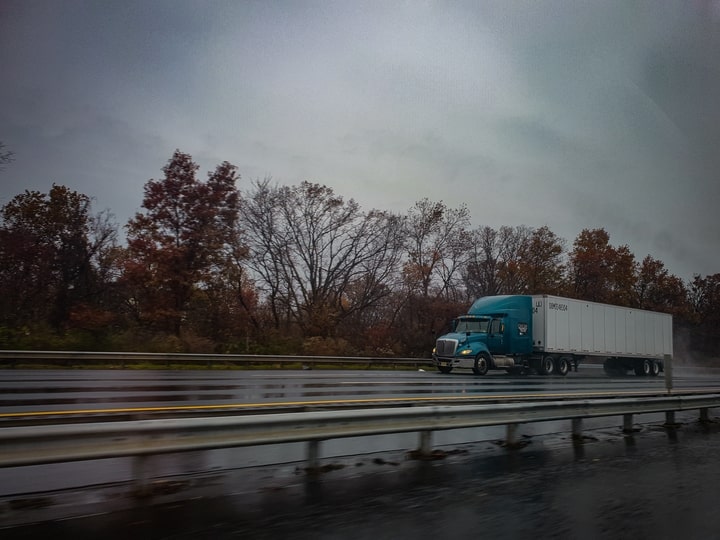
Due to its sheer size, Texas has some of the longest highways in the United States.
While this greatly increases interstate commerce, it also increases the risk of serious accidents with commercial trucks.
The likelihood of being involved in an 18-wheeler accident today, tomorrow, or sometime in the future is high—Texas has an average of 125 truck accidents per day.
At Tawney, Acosta & Chaparro P.C., we know the life-changing injuries that truck accidents cause. That’s why we aggressively fight for the compensation victims need to recover and move on.
Here is our guide to Texas truck accidents, including statistics, causes, and applicable regulations for trucking companies.
TX Truck Accident Statistics
According to the Texas Department of Transportation, there were more than 46,000 accidents involving a commercial trucks in 2020.
Around 26% of these crashes had a possible or reported injury. In addition, one out of every 26 truck accidents in Texas involved a serious injury or fatality.
When comparing different counties, the National Highway Traffic Safety Administration lists Harris County as having the most truck accidents involving fatalities.
Dallas County had the second most deaths, and Bexar had the third most. In total, the accidents in these three counties accounted for around 15% of all Texas truck accident fatalities.
From these statistics, it’s clear that truck accidents are more common in Texas than one might think. For this reason, it’s important to drive cautiously near big rigs and other commercial trucks.
What Vehicles Does Texas Consider a Truck?
Texas has different definitions for several types of trucks listed in the Texas Transportation Code § 541.201. This includes trucks, road tractors, semi-trailers, truck tractors, and light trucks.
A truck refers to any vehicle “designed, used, or maintained primarily to transport property.” Many vehicles fit under this category, including civilian pickup trucks or light trucks that carry less than 2,000 pounds of weight.
In most cases, large commercial trucks consist of a truck tractor with or without a semi-trailer. Texas defines a truck tractor as any truck designed to pull another vehicle but not built to carry a load other than that of the vehicle it’s pulling.
Most Common Causes of Texas Truck Accidents
Several factors may cause a truck accident, but the most common are:
- Speeding,
- Truck driver fatigue,
- DUI or DWI,
- Distracted driving,
- Lack of training,
- Improper maintenance,
- Poorly loaded cargo, and
- Unsafe weather conditions.
One of the reasons truck accidents are so dangerous is that large trucks carrying cargo need more time to stop.
In fact, a fully-loaded tractor-trailer traveling at highway speeds may need double the amount of road to stop compared to a small sedan.
This means that the truck driver must be focused at all times to keep everyone on the road safe.
Federal Trucking Regulations
The Federal Motor Carrier Safety Administration (FMCSA) enforces regulations for all commercial transportation companies in the United States.
These rules and regulations cover an extensive number of operation areas, including:
- Driver training,
- Vehicle maintenance,
- Insurance coverage,
- Weigh stations,
- Compliance,
- Inspections, and
- Complaint investigations.
Unfortunately, some companies try to get away with violating these rules to cut costs. One of the regulations most abused by trucking companies is the FMCSA’s hours of service limitations.
Currently, property-carrying drivers may not drive more than 11 hours after 10 consecutive hours off. In addition, drivers must take a 30-minute break every eight hours on the job and may not drive more than 60/70 hours in 7/8 consecutive days.
However, truck drivers may extend their 11-hour limit if they encounter adverse weather conditions during their shift.
Who’s Liable for a Truck Accident in Texas?
One of the more complex aspects of truck accidents is liability. There are many parties who may be at fault for the accident, depending on the situation.
This affects who you may pursue compensation in your case.
In many cases, the truck driver makes a negligent decision that leads to an accident. This includes things like DUI, falling asleep at the wheel, or making an unsafe lane change.
If the truck driver is an independent contractor, they may be responsible for the accident. However, if they are an employee, the truck company may be liable instead.
This is particularly common in cases of FMCSA violations, such as hiring an unqualified driver or making a driver work overtime.
While rare, there are certain cases where truck damage, defects, or improper cargo loading cause an accident—even when the driver tries to be safe.
In these instances, the cargo company, vehicle manufacturer, or mechanic may be responsible rather than the trucking company using the vehicle.
Another thing to keep in mind is that Texas follows a modified comparative fault doctrine.
This means that if you share some fault in the crash, you may still pursue compensation. However, if your fault is more than 50%, you can’t recover damages.
Steps to Take After an 18-Wheeler Accident in Texas
A Texas truck accident can be an incredibly traumatic experience, especially if you receive an injury. However, it’s important to stay calm and focused so that you get to safety. Here are the steps you should take following the crash.
1. Call 911 and Seek Medical Attention
The most important thing to do after a truck accident is to seek medical attention. Some injuries may not be apparent right after the collision, so be sure to accept help from the emergency responders.
Insurance companies may use any refusal of medical help as an excuse to deny your claim.
2. Try to Gather Evidence if Possible
If it’s safe to do so, collect as much evidence from the scene as possible. Photos of your injuries, vehicle damage, and road conditions all serve as the building blocks of your claim.
In addition, you need to get the truck driver’s contact information. If you see any witnesses, ask for their contact information as well.
3. Retain an Experienced Texas Truck Accident Lawyer
Once you receive medical treatment and collect evidence, contact Tawney, Acosta & Chaparro P.C.
Our Texas truck accident attorneys have decades of combined experience advocating for clients injured in these types of crashes.
We manage every aspect of your case from day one and understand what’s at stake for you and your family.
Call our office today or contact us online to schedule a free consultation.

